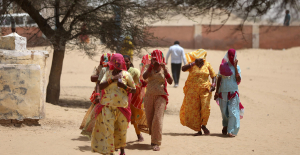the MEXICO CITY - According to a report by the International Organization for Migration (IOM) of the 250 million people who have crossed international borders, 52% are girls, adolescents and women. The overall trend sees an increasing feminisation of migration, especially in Latin America. For this, in the month of November, the member countries of the regional Conference on migration (CRM) have signed a document to guarantee the respect of human rights of migrant women, highlighting its potential as agents of change, not only for themselves but also for their families and their communities. But the sad because for years it has been the leitmotiv of many NGOS who are dedicated to the protection of women's human rights, it remains that more than half suffer violence during the journey to the place where they are travelling, so much so that many girls use contraceptive methods quotes to undertake the journey.
The Regional Conference on Migration. According to the CMR, the concept of violence in the region is made more problematic by the crime, from environmental disasters and violence, community and social factors that make it a multidimensional phenomenon and multicausale. According to the UN, Women, gender violence is the result of a complex socially, culturally, and institutionally constructed, which is part of the sexual dominance that establishes a masculinity where violence is the basis for being men, imposing the will and desires on the other, in this case, on women, which are formed as persons and self-employed persons, and in the context of migration the woman is subject to a continuum of violence transnationally.
Violence between the walls of the home. The interamerican Convention to prevent, punish and eliminate Violence against women, also known as the Convention of Belém do Pará, of 1994, of the Organization of american States (OAS) defines violence against women as any act or conduct, based on gender, which causes death, harm, physical, sexual or psychological in the public sphere as in private, specifying, in relation to the forms of violence, physical violence, sexual and psychological-against women often occurs within the same family.
The abuse during the trip . A report by the Economic Commission for Latin America and the Caribbean (ECLAC) and IOM finds that women migrants are more likely to be victims of violence if the migration occurs in an irregular way. In large part, is due to the organized crime that kidnaps people and migrants during the journey, and in the case of women often sexually abuse. The irregularity, then prevents access to justice, added to the fact that the measures of protection and social services are not adapted to the needs of migrant women. Of the murders total in the region it is estimated that at least 9.9 percent of the victims were women. Women's murders are among the most extreme forms of violence against human rights. It is observed that the highest rates of murders take place on the migratory route of the Northern Triangle central american to Mexico and the United States of America.
The economic exclusion. The situation of exclusion in economic, political and social which survives in the majority of the population in the region is manifested in the lack of jobs, access to education, and in the difficulty to meet the needs of the family: all factors that stimulate migration. The situation of need predisposes women to incurring in the risks of the journey. It is therefore necessary to provide lines of action to participate, with an integral perspective and with a humanitarian approach, in the migration process of women for this, ECLAC is powering the creation of a regional registry of the phenomenon of feminicide, which stimulates new and better public policies.
The Regional Conference on Women. The regional Conference on women in Latin America and the Caribbean is a subsidiary body of the economic Commission for Latin America and the Caribbean (ECLAC), convened on the basis of permanent and regular, with a rate not to exceed three years, to identify the situation of the regional and sub-regional with regard to the independence and the rights of women, to submit recommendations for public policies on gender equality, conduct periodic evaluations of activities carried out in respect of the regional agreements and international and provide a forum for the debate on equality of gender. Next January in Santiago, Chile, international organizations and civil society will convene to develop a diagnostic and, consequently, to present proposals for action to governments to improve the condition of women in the region, and the topic of migration will be – once again - a priority.
The Regional Conference on Migration. According to the CMR, the concept of violence in the region is made more problematic by the crime, from environmental disasters and violence, community and social factors that make it a multidimensional phenomenon and multicausale. According to the UN, Women, gender violence is the result of a complex socially, culturally, and institutionally constructed, which is part of the sexual dominance that establishes a masculinity where violence is the basis for being men, imposing the will and desires on the other, in this case, on women, which are formed as persons and self-employed persons, and in the context of migration the woman is subject to a continuum of violence transnationally.
Violence between the walls of the home. The interamerican Convention to prevent, punish and eliminate Violence against women, also known as the Convention of Belém do Pará, of 1994, of the Organization of american States (OAS) defines violence against women as any act or conduct, based on gender, which causes death, harm, physical, sexual or psychological in the public sphere as in private, specifying, in relation to the forms of violence, physical violence, sexual and psychological-against women often occurs within the same family.
The abuse during the trip . A report by the Economic Commission for Latin America and the Caribbean (ECLAC) and IOM finds that women migrants are more likely to be victims of violence if the migration occurs in an irregular way. In large part, is due to the organized crime that kidnaps people and migrants during the journey, and in the case of women often sexually abuse. The irregularity, then prevents access to justice, added to the fact that the measures of protection and social services are not adapted to the needs of migrant women. Of the murders total in the region it is estimated that at least 9.9 percent of the victims were women. Women's murders are among the most extreme forms of violence against human rights. It is observed that the highest rates of murders take place on the migratory route of the Northern Triangle central american to Mexico and the United States of America.
The economic exclusion. The situation of exclusion in economic, political and social which survives in the majority of the population in the region is manifested in the lack of jobs, access to education, and in the difficulty to meet the needs of the family: all factors that stimulate migration. The situation of need predisposes women to incurring in the risks of the journey. It is therefore necessary to provide lines of action to participate, with an integral perspective and with a humanitarian approach, in the migration process of women for this, ECLAC is powering the creation of a regional registry of the phenomenon of feminicide, which stimulates new and better public policies.
The Regional Conference on Women. The regional Conference on women in Latin America and the Caribbean is a subsidiary body of the economic Commission for Latin America and the Caribbean (ECLAC), convened on the basis of permanent and regular, with a rate not to exceed three years, to identify the situation of the regional and sub-regional with regard to the independence and the rights of women, to submit recommendations for public policies on gender equality, conduct periodic evaluations of activities carried out in respect of the regional agreements and international and provide a forum for the debate on equality of gender. Next January in Santiago, Chile, international organizations and civil society will convene to develop a diagnostic and, consequently, to present proposals for action to governments to improve the condition of women in the region, and the topic of migration will be – once again - a priority.
"The Republic will fight always in defense of the freedom of information, to its readers and to all those who have at heart the principles of democracy and civil coexistence"
Carlo Verdelli SUBSCRIBERS TO REPUBLIC © Reproduction reserved Today on Gualtieri: "the presence of The State in the economy should not be taboo. It also serves to improve the functioning of the market" Government, now the Country deserves more in The line of the Highways don't Count. “Review of the concessions is the right of the government,” The company closes in the fort: “We are ready to defend ourselves” “Rates went up much more than inflation”the Republic

 New York: at Columbia University, the anti-Semitic drift of pro-Palestinian demonstrations
New York: at Columbia University, the anti-Semitic drift of pro-Palestinian demonstrations What is Akila, the mission in which the Charles de Gaulle is participating under NATO command?
What is Akila, the mission in which the Charles de Gaulle is participating under NATO command? Lawyer, banker, teacher: who are the 12 members of the jury in Donald Trump's trial?
Lawyer, banker, teacher: who are the 12 members of the jury in Donald Trump's trial? After 13 years of mission and seven successive leaders, the UN at an impasse in Libya
After 13 years of mission and seven successive leaders, the UN at an impasse in Libya What High Blood Pressure Does to Your Body (And Why It Should Be Treated)
What High Blood Pressure Does to Your Body (And Why It Should Be Treated) Vaccination in France has progressed in 2023, rejoices Public Health France
Vaccination in France has progressed in 2023, rejoices Public Health France Food additives suspected of promoting cardiovascular diseases
Food additives suspected of promoting cardiovascular diseases “Even morphine doesn’t work”: Léane, 17, victim of the adverse effects of an antibiotic
“Even morphine doesn’t work”: Léane, 17, victim of the adverse effects of an antibiotic Unemployment insurance: tightening of the rules on July 1
Unemployment insurance: tightening of the rules on July 1 Cancers, chronic diseases... Billions of workers hit by climate change, warns the UN
Cancers, chronic diseases... Billions of workers hit by climate change, warns the UN Closure of the A13 extended until at least mid-week
Closure of the A13 extended until at least mid-week Closure of the A13: Pécresse “asks the State to take charge of making the A14 free”
Closure of the A13: Pécresse “asks the State to take charge of making the A14 free” The series adaptation of One Hundred Years of Solitude promises to be faithful to the novel by Gabriel Garcia Marquez
The series adaptation of One Hundred Years of Solitude promises to be faithful to the novel by Gabriel Garcia Marquez Racism in France: comedian Ahmed Sylla apologizes for “having minimized this problem”
Racism in France: comedian Ahmed Sylla apologizes for “having minimized this problem” Mohammad Rasoulof and Michel Hazanavicius in competition at the Cannes Film Festival
Mohammad Rasoulof and Michel Hazanavicius in competition at the Cannes Film Festival UK lends Ghana treasures stolen during colonization
UK lends Ghana treasures stolen during colonization Skoda Kodiaq 2024: a 'beast' plug-in hybrid SUV
Skoda Kodiaq 2024: a 'beast' plug-in hybrid SUV Tesla launches a new Model Y with 600 km of autonomy at a "more accessible price"
Tesla launches a new Model Y with 600 km of autonomy at a "more accessible price" The 10 best-selling cars in March 2024 in Spain: sales fall due to Easter
The 10 best-selling cars in March 2024 in Spain: sales fall due to Easter A private jet company buys more than 100 flying cars
A private jet company buys more than 100 flying cars This is how housing prices have changed in Spain in the last decade
This is how housing prices have changed in Spain in the last decade The home mortgage firm drops 10% in January and interest soars to 3.46%
The home mortgage firm drops 10% in January and interest soars to 3.46% The jewel of the Rocío de Nagüeles urbanization: a dream villa in Marbella
The jewel of the Rocío de Nagüeles urbanization: a dream villa in Marbella Rental prices grow by 7.3% in February: where does it go up and where does it go down?
Rental prices grow by 7.3% in February: where does it go up and where does it go down? Europeans: “All those who claim that we don’t need Europe are liars”, criticizes Bayrou
Europeans: “All those who claim that we don’t need Europe are liars”, criticizes Bayrou With the promise of a “real burst of authority”, Gabriel Attal provokes the ire of the opposition
With the promise of a “real burst of authority”, Gabriel Attal provokes the ire of the opposition Europeans: the schedule of debates to follow between now and June 9
Europeans: the schedule of debates to follow between now and June 9 Europeans: “In France, there is a left and there is a right,” assures Bellamy
Europeans: “In France, there is a left and there is a right,” assures Bellamy These French cities that will boycott the World Cup in Qatar
These French cities that will boycott the World Cup in Qatar Basketball (F): big winner of Asvel, Basket Landes will face Tarbes in the semi-final of the League
Basketball (F): big winner of Asvel, Basket Landes will face Tarbes in the semi-final of the League Football: Yazici (Lille) “in shock” after an attempted theft at his home
Football: Yazici (Lille) “in shock” after an attempted theft at his home Serie A: victorious over AC Milan, Inter crowned Italian champions for the 20th time
Serie A: victorious over AC Milan, Inter crowned Italian champions for the 20th time Serie A: “Winning a title in a derby has never happened,” relishes Martinez after Inter’s coronation
Serie A: “Winning a title in a derby has never happened,” relishes Martinez after Inter’s coronation


















